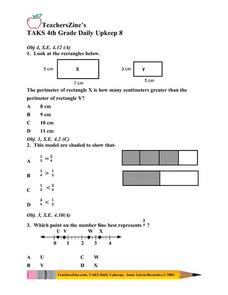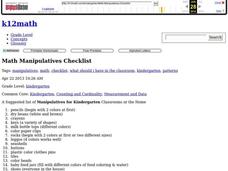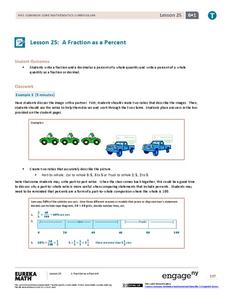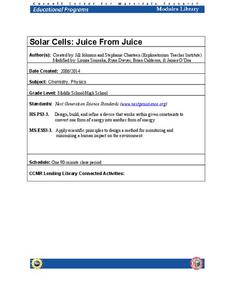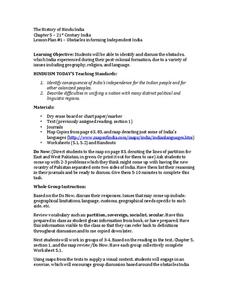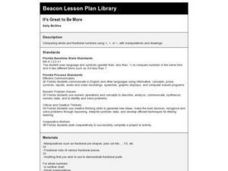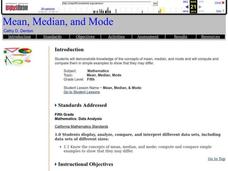Curated OER
Subtracting Decimals
In this subtracting decimals worksheet, students solve 10 problems in which decimal numbers to the hundredths place are subtracted, sometimes with regrouping. The problems are already properly written with decimal points aligned.
Curated OER
Atoms and Their Interactions
In this atoms worksheet, students will review the characteristics of elements, atoms, and isotopes. Then students will compare the difference between ionic and covalent bonds. Finally, students will balance a chemical equation. This...
Curated OER
Junk Yard Math
Third graders explore the process of place value and subtraction through regrouping and borrowing exercises. Several activities using manipulatives are utilized in the lesson.
Curated OER
Daily Upkeep 8
In this math worksheet, 4th graders complete a quick set of math problems where they first look at two rectangles and find the difference between the two in centimeters. Then, they compare two figures are select which fraction best...
Curated OER
Patterns
Explore early algebra by participating in a pattern identification activity using a random assortment of different household materials. The class creates, completes, and analyzes different patterns with the help of leggos, buttons,...
EngageNY
A Fraction as a Percent
It is all about being equivalent. Class members convert between fractions, decimals, and percents. By using visual models, scholars verify their conversions in the 25th portion of a 29-part series.
West Virginia Department of Education
The Debate - John Brown: Martyr or Madman?
Did he die for a cause, or was he crazy? Although the resource discusses John Brown and West Virginia history, many historical figures have the same reputation. Teach learners about different perspectives and highlight the importance of...
EngageNY
Displaying a Data Distribution
Pupils analyze a display of data and review dot plots to make general observations about the highest, lowest, common, and the center of the data. To finish, learners match dot plots to scenarios.
Cornell University
Solar Cells: Juice From Juice
Unleash the power of ... blackberries! Science superstars create solar cells using the juice of berries or leaves of a citrus tree in an engaging lab. In addition to offering a plethora of resources, the teacher's guide gives background...
Inside Mathematics
Conference Tables
Pupils analyze a pattern of conference tables to determine the number of tables needed and the number of people that can be seated for a given size. Individuals develop general formulas for the two growing number patterns and use them to...
It's About Time
What Determines and Limits an Atom's Mass?
Provide learners with the tools to further understand nuclear energy and isotopes. Young chemists investigate the components of an atom's nucleus, use symbols to represent various isotope forms, and use the percent abundance of an atom's...
Association of American Geographers
Project GeoSTART
Investigate the fascinating, yet terrifying phenomenon of hurricanes from the safety of your classroom using this earth science unit. Focusing on developing young scientists' spacial thinking skills, these lessons engage learners in...
Kauai's Hindu Monastery
The History of Hindu India
What obstacles did India face during their post-colonial formation after gaining independence? Topics discussed in the lesson include Pakistan's conflict over Kashmir, the Indian Constitution, economic development, and the influence of...
Beyond Benign
Can You Hear Me Now? Cell Phone Accounts
How sustainable are cell phones? Throughout the unit, learners explore the issues around cell phones concerning sustainability. Class members take a graphical look at the number of cell phones across the world using a box-and-whisker...
Reading Through History
The Federalist Papers: Federalist Paper No. 51
How did Federalists feel about the federal government? Learners search for the answers in the Federalist Paper No. 51, which discusses the powers of the presidency. Then, they answer various questions to test for their comprehension of...
American Museum of Natural History
What's This? Feeding
Some species have pretty creative methods for catching food. Young scientists learn about some interesting ways organisms get the nutrients they need by navigating an online interactive lesson that would be suitable for a remote learning...
Curated OER
Divisibility Checks: Paired Activity
In this division game worksheet, students will work in small groups to play a game about dividing numbers. A teacher's guide with game instructions is included.
Curated OER
Ratios
Sixth graders investigate the concept of ratios and how they can be used to represent the comparison of quantities. The activity is taught using a table or graph to compare two categories of data.
Curated OER
It's Great to Be More
Learners compare whole and fractional numbers using <, >, or =, with manipulatives and drawings.
Helping with Math
Identifying and Writing Decimals up to Thousandths
A simple worksheet asks learners to write five numbers in decimal form. Sets of blocks represent the numbers and include whole number blocks, tenths, hundredths, and thousandths. Use this to follow other worksheets by the same publisher...
Curated OER
Mean, Median, and Mode
Fifth graders compute the mean, median, and mode of sets of numbers.
Curated OER
Converting Decimals to Fractions (3 of 3)
In this decimal conversion worksheet, students use their problem solving skills to convert 18 decimal numbers to fractions or mixed numbers in lowest terms.
Curated OER
Finding Sums to 6
Students explore the additive identity property where they add multiple numbers to get to the number 6. In this number 6 lesson plan, students also work on their addition charts.
Curated OER
Outdoor Survival
Students are introduced to basic outdoor survival concepts. They identify the seven basic needs for survival. Students describe the symptoms and treatment for frostbite and hypothermia. They compare and contrast the value of different...





